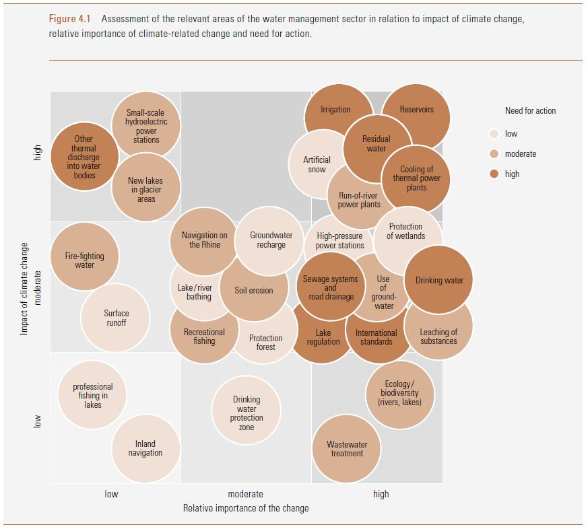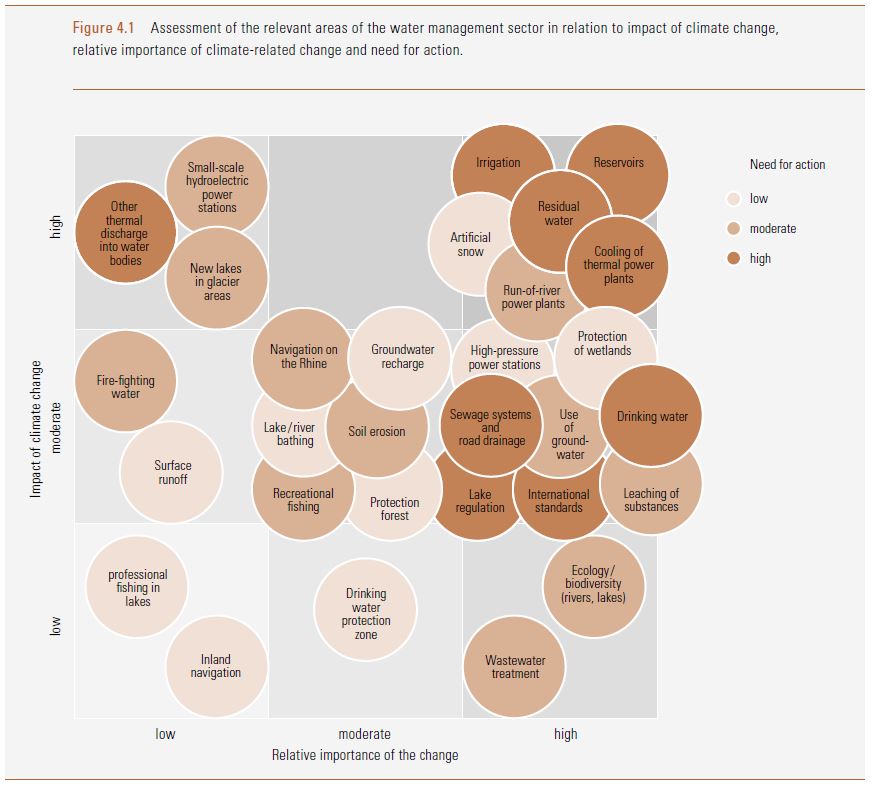Climate-related changes in the water cycle impact all areas of water management. The need for action results from lower outflows, the possible increase in drought and low water in summer, the rise in water temperatures and the increase in flooding. The changed water supply can lead to conflicts of use.
Fields of action and the Confederation’s goals
For water management, eight objectives can be defined:
- The safety of large dams is guaranteed.
- Water storage and distribution are designed to balance the effects of changed drainage regimes and to meet the various needs of the economy, society and ecology (setting priorities and practices in times of scarce water supply and multi-purpose use of existing reservoirs and lakes).
- For watercourses, sufficient space is ensured for revitalization, flood control and ecology improvement so that they can perform their natural functions.
- Drinking water supply and wastewater treatment are regionalised and networked (avoiding scarcity situations, avoidance of excessive pollution due to discharge into the watercourses during periods of low water or extreme events).
- New cooling technologies make it possible to compensate for the decreasing cooling capacity of the watercourses and to comply with the statutory limit for the discharge of cooling water despite continued warming.
- The legal foundations are reviewed and take into account - where necessary - the changing natural conditions (residual water, heat discharge, water returns, maritime regulation, etc.).
- Selective measures on the Rhine waterway (eliminating local obstacles, deepening the channel) and exploiting technical possibilities in shipbuilding together with an improvement of the 4-5-day water level forecasts optimize the transport capacity in times of low water.
- Conflicts of interest in cross-border water management are identified and resolved at an early stage, thanks to improved cooperation.
The field of soil erosion is included in the agriculture sector under the objective of site suitability. Recreational fishing also forms an aspect of the objective of habitats and species of the sector biodiversity management.
An overall coordination of water management has been missing so far. Adapting to climate change is a challenge that requires new, overarching concepts. In order to be able to successfully implement the goals mentioned above, some requirements must
be met:
- A holistic understanding of water management must be established: water management addresses all human impacts on the resource of water and bodies of water and their associated infrastructures. It encompasses all targeted activities that serve the protection of waters, the use of water and protection against water.
- A paradigm shift from a predominantly demand-oriented to a more supply-oriented water management is required: instead of simply using water, it must be managed sustainably in the future.
- The institutional conditions for facilitating and promoting integral water management must be created. A first step has been taken with the document "River Basin Management - Guiding Principles for Integral Water Management in Switzerland".
The knowledge of the quantitative impacts of climate change on the water balance and the runoff is still insufficient. Therefore, the continuation and strengthening of the measurement networks and the climate and climate-impact modelling in the water
sector is essential.
Further informations
Last modification 03.06.2016
Contact
Federal Office for the Environment FOEN
Reporting and Adaptation Section
Papiermühlestr. 172
3063 Ittigen







